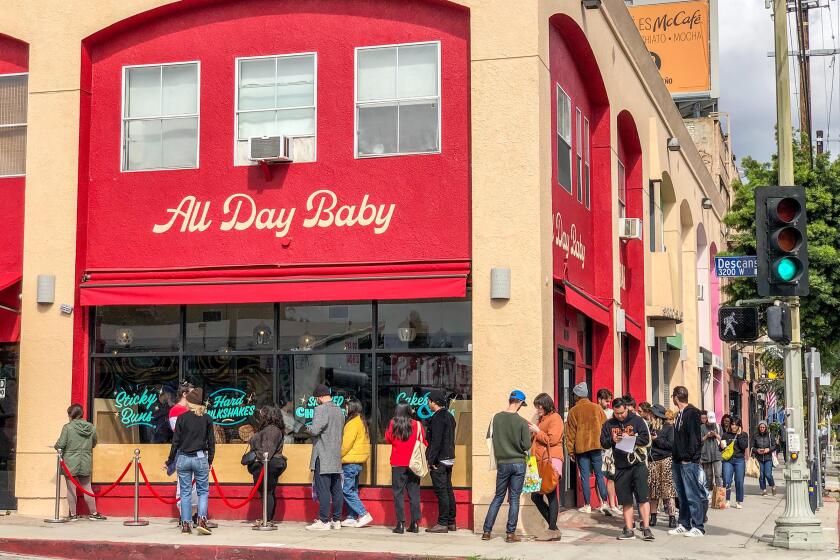How the early, record heat could affect your ability to make Fourth of July guacamole
- Share via
Last week’s triple-digit heat wreaked havoc on Southern California avocado farms, leaving some growers with burnt trees and unsellable fruit just two weeks before the Fourth of July holiday, when avocado sales generally spike.
Growers in Fallbrook, De Luz and Temecula reported record temperatures between 110 and 117 degrees, as well as 30-mile per hour winds – a potentially devastating combination for avocado groves planted in sandy soil where the fierce winds can wick away moisture faster than the trees can absorb it.
Tom Bellamore, president of the California Avocado Commission, was in the groves last week, where he saw shriveled leaves, branches that were badly sunburned and some fruit drop, particularly on younger trees. As for the long-term consequences, he explains, “After the heat, it takes a while for the effects to manifest themselves, so at this point, we’re uncertain if there is a loss or not to next year’s crop.”
The heat blast is yet another setback to California avocado growers, who are battling water woes, labor shortages and increased competition from Mexican avocados, which now command more than 80% of the U.S. market. Bellamore says the California avocado industry as a whole remains strong – three out of the last six years have seen a crop value of more than $400 million, the best the industry has ever seen – but small growers, especially those dependent on municipal water, are ill-equipped to withstand a series of blows.
Garcia Organic Farm in Fallbrook lost five of its 29 avocado trees in the heat wave, which means an early end to its avocado season at the Santa Monica Farmers Markets. The family’s finger lime trees, which Leticia Garcia described as “like gold” for their $50 per pound price tag, were left withered beyond repair, and their entire Persian mulberry crop was decimated.
Bob Polito, another longtime seller at the Santa Monica Farmers Market, says this Wednesday’s market truckload will include a lot of dropped fruit, or seconds, which he salvaged for market shoppers looking to make guacamole this holiday weekend.
For growers who depend on packinghouses, dropped fruit does not command the premium that farmers can get for picked fruit. As of Monday this week, packinghouses were paying growers $1.56 a pound for size 48 avocados (those that weigh 7.5 to 9.5 ounces), up from $1.18 last month.
Heath Shoup of West Pak Avocado, a packinghouse in Murrieta, says Mexican growers overestimated and underperformed this year. “There are not enough avocados in the industry right now to supply the demand,” he says. With supply low, California farmers could be reaping the benefits, but the damage from last week’s scorching temperatures will prevent some growers from taking advantage of higher prices.
The biggest effect of last week’s heat storm may be on next year’s crop. Jeanne Davis of Coyote Growers was nearing the end of her Hass season when temperatures climbed up to 113 degrees on her 6-acre Fallbrook orchard. While the blast may not affect this year’s farmers market sales, she is concerned about next year.
“We’ve been here for 25 years, and this has never happened before,” she says. “There will probably be a minimal amount of avocados for next year because we think that some of the flowers didn’t make it.”
As for what she plans to do next, she says: “It’ll be a little bit of a wait and see. What else can you do really?”
ALSO:
The only guacamole recipe you’ll ever need
Chef Teresa Montaño leaves Ración for new project
La Casita Mexicana chefs host a monthlong enchilada festival in July
More to Read
Eat your way across L.A.
Get our weekly Tasting Notes newsletter for reviews, news and more.
You may occasionally receive promotional content from the Los Angeles Times.









